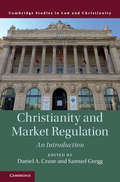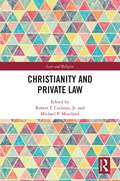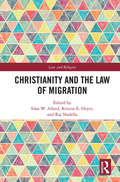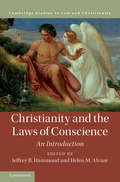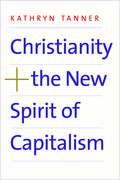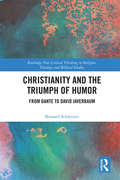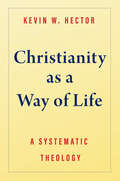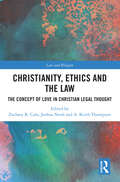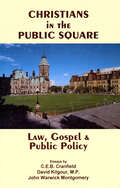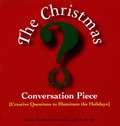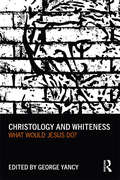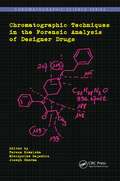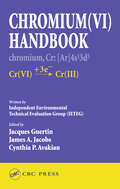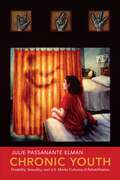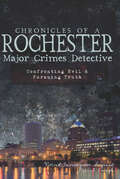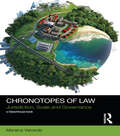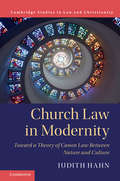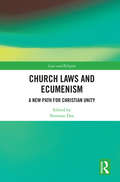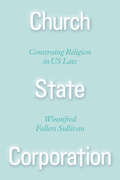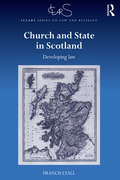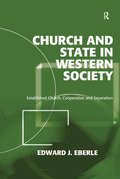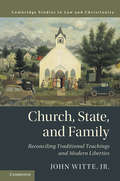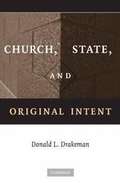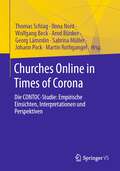- Table View
- List View
Christianity and Market Regulation: An Introduction (Law and Christianity)
by Samuel Gregg Daniel A. CraneHistorically, the Christian tradition has played an influential role in Western economic thought concerning the regulation of markets, but, with the fracturing of the Christian tradition following the Reformation, the decline of Christian influence in academia, and the increasing specialization of economic analysis, that influence has become increasingly opaque. This volume brings together an interdisciplinary team of prominent academic experts on market regulation from four different continents and various faith traditions to reconsider the impact of Christianity on market regulation. Drawing on law, economics, history, theology, philosophy, and political theory, the authors consider both general questions of market regulation and particular regulatory fields such as bankruptcy, corporate law, and antitrust from a Christian perspective.
Christianity and Private Law (Law and Religion)
by Robert F. Cochran Jr. Michael P. MorelandThis volume examines the relationship between Christian legal theory and the fields of private law. Recent years have seen a resurgence of interest in private law theory, and this book contributes to that discussion by drawing on the historical, theological, and philosophical resources of the Christian tradition. The book begins with an introduction from the editors that lays out the understanding of "private law" and what distinguishes private law topics from other fields of law. This section includes two survey chapters on natural law and biblical sources. The remaining sections of the book move sequentially through the fields of property, contracts, and torts. Several chapters focus on historical sources and show the ways in which the evolution of legal doctrine in areas of private law has been heavily influenced by Christian thinkers. Other chapters draw out more contemporary and public policy-related implications for private law. While this book is focused on the relationship of Christianity to private law, it will be of broad interest to those who might not share that faith perspective. In particular, legal historians and philosophers of law will find much of interest in the original scholarship in this volume. The book will be attractive to teachers of law, political science, and theology. It will be of special interest to the many law faculty in property, contracts, and torts, as it provides a set of often overlooked historical and theoretical perspectives on these fields.
Christianity and the Law of Migration (Law and Religion)
by Silas W. Allard; Kristin E. Heyer; Raj NadellaThis collection brings together legal scholars and Christian theologians for an interdisciplinary conversation responding to the challenges of global migration. Gathering 14 leading scholars from both law and Christian theology, the book covers legal perspectives, theological perspectives, and key concepts in migration studies. In Part 1, scholars of migration law and policy discuss the legal landscape of migration at both the domestic and international level. In Part 2, Christian theologians, ethicists, and biblical scholars draw on the resources of the Christian tradition to think about migration. In Part 3, each chapter is co-authored by a scholar of law and a scholar of Christian theology, who bring their respective resources and perspectives into conversation through a conversation on key themes within migration studies. The work provides a truly interdisciplinary introduction to the topic of migration for those who are new to the subject; an opportunity for immigration lawyers and legal scholars to engage Christian theology; an opportunity for pastors and Christian theologians to engage law; and new insights on key frameworks for scholars who are already committed to the study of migration.
Christianity and the Laws of Conscience: An Introduction (Law and Christianity)
by Helen M. Alvaré Jeffrey B. HammondConscience has long been a foundational theme in Christian ethics, but it is a notoriously slippery and contested term. This volume works to define conscience and reveal the similarities and differences between different Christian traditions' thinking on the subject. In a thorough and scholarly manner, the authors explore Christian theological, legal, constitutional, historical, and philosophical meanings of conscience. Covering a range of historical periods, major figures in the development of conscience, and contemporary applications, this book is a vital source for scholars from a wide variety of disciplines seeking to understand conscience from a range of perspectives.
Christianity and the New Spirit of Capitalism
by Kathryn TannerOne of the world’s most celebrated theologians argues for a Protestant anti-work ethic In his classic The Protestant Ethic and the Spirit of Capitalism, Max Weber famously showed how Christian beliefs and practices could shape persons in line with capitalism. In this significant reimagining of Weber’s work, Kathryn Tanner provocatively reverses this thesis, arguing that Christianity can offer a direct challenge to the largely uncontested growth of capitalism. Exploring the cultural forms typical of the current finance‑dominated system of capitalism, Tanner shows how they can be countered by Christian beliefs and practices with a comparable person‑shaping capacity. Addressing head‑on the issues of economic inequality, structural under- and unemployment, and capitalism’s unstable boom/bust cycles, she draws deeply on the theological resources within Christianity to imagine anew a world of human flourishing. This book promises to be one of the most important theological books in recent years.
Christianity and the Triumph of Humor: From Dante to David Javerbaum (Routledge New Critical Thinking in Religion, Theology and Biblical Studies)
by Bernard SchweizerThis book traces the development of religious comedy and leverages that history to justify today’s uses of religious humor in all of its manifestations, including irreverent jokes. It argues that regulating humor is futile and counterproductive, illustrating this point with a host of comedic examples. Humor is a powerful rhetorical tool for those who advocate and for those who satirize religious ideals. The book presents a compelling argument about the centrality of humor to the story of Western Christianity’s cultural and artistic development since the Middle Ages, taking a multi-disciplinary approach that combines literary criticism, religious studies, philosophy, theology, and social science. After laying out the conceptual framework in Part 1, Part 2 analyzes key works of religious comedy across the ages from Dante to the present, and it samples the breadth of contemporary religious humor from Brad Stine to Robin Williams, and from Monty Python to South Park. Using critical, historical, and conceptual lenses, the book exposes and overturns past attempts by church authorities, scholars, and commentators to limit and control laughter based on religious, ideological, or moral criteria. This is a unique look into the role of humor and comedy around religion. It will, therefore, be of great interest to scholars of Religious Studies, Humor Studies, and the Sociology of Religion.
Christianity as a Way of Life: A Systematic Theology
by Kevin W HectorFocusing on Christianity’s core practices, a leading theologian imagines Christianity as a way of life oriented toward wisdom In this book, Kevin W. Hector argues that we can understand Christianity as a set of practices designed to transform one’s way of perceiving and being in the world. Hector examines practices that reorient us to God (imitation, corporate singing, eating together, friendship, and likemindedness), that transform our way of being in the world (prayer, wonder, laughter, lament, and vocation), and that reshape our way of being with others (benevolence, looking for the image of God in others, forgiveness, and activism). Taken together, the aim of these practices is to transform one’s way of perceiving and acting in the face of success and failure, risk and loss, guilt and shame, love, and loss of control. These transformations can add up to a transformation of one’s very self. To make sense of Christianity as a way of life, in turn, these practices must be understood within the context of Christian beliefs about sin, Jesus, redemption, and eternal life. Understanding them thus requires a systematic theology, which Hector offers in this clear-eyed, ambitious, and elegant interpretation of the Christian tradition.
Christianity, Ethics and the Law: The Concept of Love in Christian Legal Thought (Law and Religion)
by Zachary R. Calo, Joshua Neoh and A. Keith ThompsonThis book examines how Christian love can inform legal thought. The work introduces love as a way to advance the emergent conversation between constructive theology and jurisprudence that will also inform conversations in philosophy and political theory. Love is the central category for Christian ethical understanding. Yet, the growing field of law and religion, and relatedly law and theology, rarely address how love can shape our understanding of law. This reflects, in part, a common assumption that law and love stand in necessary tension. Love applies to the private and the personal. Law, by contrast, applies to the public and the political, realms governed by power. It is thus a mistake to envisage love as having anything but a negative relationship to law. This conclusion continues to govern Christian understandings of the meaning and vocation of law. The animating idea of this volume is that the concept of love can and should inform Christian legal thought. The project approaches this task from the perspective of both historical and constructive theology. Various contributions examine how such thinkers as Augustine, Aquinas, and Calvin utilised love in their legal thought. These essays highlight often neglected aspects of the Christian tradition. Other contributions examine Christian love in light of contemporary legal topics including civility, forgiveness, and secularism. Love, the book proposes, not only matters for law but can transform the terms on which Christians understand and engage it.? The book will be of interest to academics and researchers working in the areas of legal theory; law and religion; law and philosophy; legal history; theology and religious studies; and political theory.
Christians In The Public Square: Law, Gospel, & Public Policy
by John Warwick MontgomeryThis collection of articles examining the inter-relationship between "law" and "gospel"; what a Christian should and should not attempt to do in the public realm of politics; and bioethical issues. Included are essays by David Kilgour, one of Canada's longest serving Members of Parliament, providing the perspective of a practicing politician; and theologian C. E. B. Cranfield on the New Testament's teaching.
Christmas Conversation Piece
by Bret Nicholaus Paul LowrieWhat one Christmas tradition would you never want to give up? If you could spend Christmas anywhere in the world, where would you most want to be? If you could have visited the Christ child just as the Three Kings did, what would you have brought as a gift? You've been chosen to host a sensational Christmas celebration on TV: What three guests would you choose to make it the best Christmas special ever? The Christmas Conversation Pieceoffers these and many other questions to pose and ponder during a season of both deep reflection and unabashed merriment. This charming volume--the perfect stocking stuffer--will provide you, your family, and your friends with twelve days of surprising and amusing Yuletide questions. Who would you most like to meet under the mistletoe? Your answer just may change by Christmas Eve!
Christology and Whiteness: What Would Jesus Do?
by George YancyThis book explores Christology through the lens of whiteness, addressing whiteness as a site of privilege and power within the specific context of Christology. It asks whether or not Jesus’ life and work offers theological, religious and ethical resources that can address the question of contemporary forms of white privilege. The text seeks to encourage ways of thinking about whiteness theologically through the mission of Jesus. In this sense, white Christians are encouraged to reflect on how their whiteness is a site of tension in relation to their theological and religious framework. A distinguished team of contributors explore key topics including the Christology of domination, different images of Jesus and the question of identification with Jesus, and the Black Jesus in the inner city.
Chromatographic Techniques in the Forensic Analysis of Designer Drugs (Chromatographic Science Series)
by Joseph Sherma Teresa Kowalska Mieczyslaw SajewiczThere is a dramatic rise of novel drug use due to the increased popularity of so-called designer drugs. These synthetic drugs can be illegal in some countries, but legal in others and novel compounds unknown to drug chemistry emerge monthly. This thoughtfully constructed edited reference presents the main chromatographic methodologies and strategies used to discover and analyze novel designer drugs contained in diverse biological materials. The methods are based on molecular characteristics of the drugs belonging to each individual class of compounds, so it will be clear how the current methods are adaptable to future new drugs that appear in the market.
Chromium(VI) Handbook
by James A. Jacobs Jacques Guertin Cynthia P. AvakianPut together by a team of scientists, engineers, regulators, and lawyers, the Chromium(VI) Handbook consolidates the latest literature on this topic. The broad scope of this book fills the need for a comprehensive resource on chromium(VI), improving the knowledge of this contaminant at a time when the extent and degree of the problem is still being
Chronic Youth: Disability, Sexuality, and U.S. Media Cultures of Rehabilitation (NYU Series in Social and Cultural Analysis #4)
by Julie Passanante ElmanThe teenager has often appeared in culture as an anxious figure, the repository for American dreams and worst nightmares, at once on the brink of success and imminent failure. Spotlighting the “troubled teen” as a site of pop cultural, medical, and governmental intervention, Chronic Youth traces the teenager as a figure through which broad threats to the normative order have been negotiated and contained. Examining television, popular novels, science journalism, new media, and public policy, Julie Passanante Elman shows how the teenager became a cultural touchstone for shifting notions of able-bodiedness, heteronormativity, and neoliberalism in the late twentieth century. By the late 1970s, media industries as well as policymakers began developing new problem-driven ‘edutainment’ prominently featuring narratives of disability—from the immunocompromised The Boy in the Plastic Bubble to ABC’s After School Specials and teen sick-lit. Although this conjoining of disability and adolescence began as a storytelling convention, disability became much more than a metaphor as the process of medicalizing adolescence intensified by the 1990s, with parenting books containing neuro-scientific warnings about the incomplete and volatile “teen brain.” Undertaking a cultural history of youth that combines disability, queer, feminist, and comparative media studies, Elman offers a provocative new account of how American cultural producers, policymakers, and medical professionals have mobilized discourses of disability to cast adolescence as a treatable “condition.” By tracing the teen’s uneven passage from postwar rebel to 21st century patient, Chronic Youth shows how teenagers became a lynchpin for a culture of perpetual rehabilitation and neoliberal governmentality.
Chronicles of a Rochester Major Crimes Detect: Confronting Evil & Pursuing Truth (True Crime)
by Patrick CroughA longtime Rochester, New York, police detective tells the behind-the-scenes stories of four of his most memorable cases. Patrick Crough served more than twenty years as a Monroe County Major Crimes detective, where he investigated some of the region&’s most tragic crimes. They include horrifying acts, like that of a Valentine&’s Day killing rampage that left four people dead, as well as the case against Ed Laraby, the serial rapist who terrorized women in Rochester and Monroe County. But there are also stories of heroism and bravery: strangers coming to the aid of those in peril, parents who laid down their lives to save their children, and the team of people who put violent criminals behind bars. In these pages, Crough details four of his most memorable cases—in which he was forced to confront evil and chose to pursue truth.
Chronotopes of Law: Jurisdiction, Scale and Governance (Social Justice)
by Mariana ValverdeThis book develops a new framework for analyzing the spatio-temporal workings of law and other forms of governance. Chronotopes of Law argues that studies of law and governance can be reinvigorated by drawing on a bundle of quite heterogenous analytical tools that do not have a single provenance or a single political or normative aim but that work well in combination. Analyses of legal temporality carried out by anthropologists and studies of law and space undertaken by geographers and legal scholars have proliferated in recent years, but these research traditions have remained largely separate. By adapting notions such as intertextuality, dialogism, and the ‘chronotope’ from Mikhail Bakhtin, notions designed specifically to synthesize considerations of space and time in a framework that is open-ended, interactive and dynamic, Mariana Valverde develops an anti-metaphysical theory and method for legal studies. This approach will be useful both to theorists and to researchers seeking to illuminate the actual workings of law and other forms of governance. Indeed, a key aim of the book is to break down the institutional and disciplinary barriers that prevent theorists from learning from empirical studies and viceversa. Written by one of the foremost sociolegal scholars writing today, this theoretically innovative work constitutes a major contribution to contemporary studies in law and society.
Chuang Tzŭ: Taoist Philosopher and Chinese Mystic
by Herbert A. Giles Zhuang ZiChuang Tzŭ belongs to a period three or four centuries before Christ. A disciple of Lao Tzŭ, his writings, which as a consequence are mostly allegorical, are an attempt to refute the materialistic Confucian teaching that arose after Lao Tzŭ's death. Although Chuang Tzŭ failed in his aims, he left a work of marvellous literary beauty and great originality. This classic translation makes Chuang Tzŭ available to English readers with the aid of a running commentary incorporated in the body of the text.
Church Law in Modernity: Toward a Theory of Canon Law between Nature and Culture (Law and Christianity)
by Judith HahnNatural law has long been considered the traditional source of Roman Catholic canon law. However, new scholarship is critical of this approach as it portrays the Catholic Church as static, ahistorical, and insensitive to cultural change. In its attempt to stem the massive loss of effectiveness being experienced by canon law, the church has to reconsider its theory of legal foundation, especially its natural law theory. Church Law in Modernity analyses the criticism levelled at the church and puts forward solutions for reconciling church law with modernity by revealing the historical and cultural authenticity of all law, and revising the processes of law making. In a modern church, there is no way of thinking of the law without the participation of the faithful in legislation. Judith Hahn therefore proposes a reformed legislative process for the church in the hope of reconciling the natural law origins of church law with a new, modern theology.
Church Laws and Ecumenism: A New Path for Christian Unity (Law and Religion)
by Norman DoeWritten by experts from within their communities, this book compares the legal regimes of Christian churches as systems of religious law. The ecumenical movement, with its historical theological focus, has failed to date to address the role of church law in shaping relations between churches and fostering greater mutual understanding between them. In turn, theologians and jurists from the different traditions have not hitherto worked together on a fully ecumenical appreciation of the potential value of church laws to help, and sometimes to hinder, the achievement of greater Christian unity. This book seeks to correct this ecumenical church law deficit. It takes account of the recent formulation by an ecumenical panel of a Statement of Principles of Christian Law, which has been welcomed by Pope Francis and the Ecumenical Patriarch of Constantinople, leader of the Orthodox Church worldwide, as recognizing the importance of canon law for ecumenical dialogue. This book, therefore, not only provides the fruits of an understanding of church laws within ten Christian traditions, but also critically evaluates the Statement against the laws of these individual ecclesial communities. The book will be an essential resource for scholars of law and religion, theology, and sociology. It will also be of interest to those working in religious institutions and policy-makers.
Church State Corporation: Construing Religion in US Law
by Winnifred Fallers SullivanChurch and state: a simple phrase that reflects one of the most famous and fraught relationships in the history of the United States. But what exactly is “the church,” and how is it understood in US law today? In Church State Corporation, religion and law scholar Winnifred Fallers Sullivan uncovers the deeply ambiguous and often unacknowledged ways in which Christian theology remains alive and at work in the American legal imagination. Through readings of the opinions of the US Supreme Court and other legal texts, Sullivan shows how “the church” as a religious collective is granted special privilege in US law. In-depth analyses of Hosanna-Tabor v. EEOC and Burwell v. Hobby Lobby reveal that the law tends to honor the religious rights of the group—whether in the form of a church, as in Hosanna-Tabor, or in corporate form, as in Hobby Lobby—over the rights of the individual, offering corporate religious entities an autonomy denied to their respective members. In discussing the various communities that construct the “church-shaped space” in American law, Sullivan also delves into disputes over church property, the legal exploitation of the black church in the criminal justice system, and the recent case of Masterpiece Cakeshop v. Colorado Civil Rights Commission. Brimming with insight, Church State Corporation provocatively challenges our most basic beliefs about the ties between religion and law in ostensibly secular democracies.
Church and State in Scotland: Developing law (ICLARS Series on Law and Religion)
by Francis LyallThe interaction of faith and the community is a fundamental of modern society. The first country to adopt Presbyterianism in its national church, Scotland adopted a system of church government, which is now in world-wide use. This book examines the development and current state of Scots law. Drawing on previous material as well as discussing current topical issues, this book makes some comparisons between Scotland and other legal and religious jurisdictions. The study first considers the Church of Scotland, its ’Disruption’ and statutorily recognised reconstitution and then the position of other denominations before assessing the interaction of religion and law and the impact of Human Rights and various discrimination laws within this distinctive Presbyterian country. This unique book will be of interest to both students and lecturers in constitutional and civil law, as well as historians and ecclesiastics.
Church and State in Western Society: Established Church, Cooperation and Separation
by Edward J. EberleThe role of religion as a contentious and motivating force in society is examined here through the lens of the church-state dynamic in countries with three very different approaches to this crucial relationship. Focusing on the United Kingdom, where there is official recognition of one religion by the state, the United States, where law imposes a separatism between religion and the state and Germany, where there is cooperation between the church and state, this book compares these three models. It describes the components of each model, illustrates their operation and uses case law to examine what each model might learn from the other. Controversial and timely issues such as the refusal of medical treatment on religious grounds, the wearing of Islamic headscarves and ritual animal slaughter are discussed with new insight, providing a comprehensive review of varied approaches to law, government and religious freedom.
Church, State, and Family: Reconciling Traditional Teachings and Modern Liberties (Law and Christianity)
by John Witte, Jr.This book defends the fundamental place of the marital family in modern liberal societies. While applauding modern sexual freedoms, John Witte, Jr also defends the traditional Western teaching that the marital family is an essential cradle of conscience, chrysalis of care, and cornerstone of ordered liberty. He thus urges churches, states, and other social institutions to protect and promote the marital family. He encourages reticent churches to embrace the rights of women and children, as Christians have long taught, and encourages modern states to promote responsible sexual freedom and family relations, as liberals have long said. He counsels modern churches and states to share in family law governance, and to resist recent efforts to privatize, abolish, or radically expand the marital family sphere. Witte also invites fellow citizens to end their bitter battles over same-sex marriage and tend to the vast family field that urgently needs concerted attention and action.
Church, State, and Original Intent
by Donald L. DrakemanThis provocative book shows how the United States Supreme Court has used constitutional history in church-state cases. Donald L. Drakeman describes the ways in which the justices have portrayed the Framers' actions in a light favoring their own views about how church and state should be separated. He then marshals the historical evidence, leading to a surprising conclusion about the original meaning of the First Amendment's establishment clause: the framers originally intended the establishment clause only as a prohibition against a single national church. In showing how conventional interpretations have gone astray, he casts light on the close relationship between religion and government in America and brings to life a fascinating parade of church-state constitutional controversies from the Founding Era to the present.
Churches Online in Times of Corona: Die CONTOC-Studie: Empirische Einsichten, Interpretationen und Perspektiven
by Wolfgang Beck Arnd Bünker Thomas Schlag Ilona Nord Georg Lämmlin Sabrina Müller Johann Pock Martin RothgangelDie CONTOC-Studie hat in ökumenischer und internationaler Ausrichtung die digitale kirchliche Praxis unter den Bedingungen der Corona-Pandemie im Frühsommer 2020 erforscht. Dieser Band dokumentiert die Rahmenbedingungen und Umfrageergebnisse in den beteiligten Ländern. Daran schließen sich Perspektiven zu den zukünftigen Herausforderungen für die digitale Angebotspraxis und das Selbstverständnis der kirchlichen Akteur*innen an. Churches Online in Times of Corona. The CONTOC study: Empirical insights, interpretations and perspectives The CONTOC study has explored digital church practice under the conditions of the COVID-19 pandemic in the early summer of 2020 in an ecumenical and international way. This volume documents the framework conditions and survey results in the participating countries. This is followed by perspectives on the future challenges for the digital practice and the selfunderstanding of church actors.
